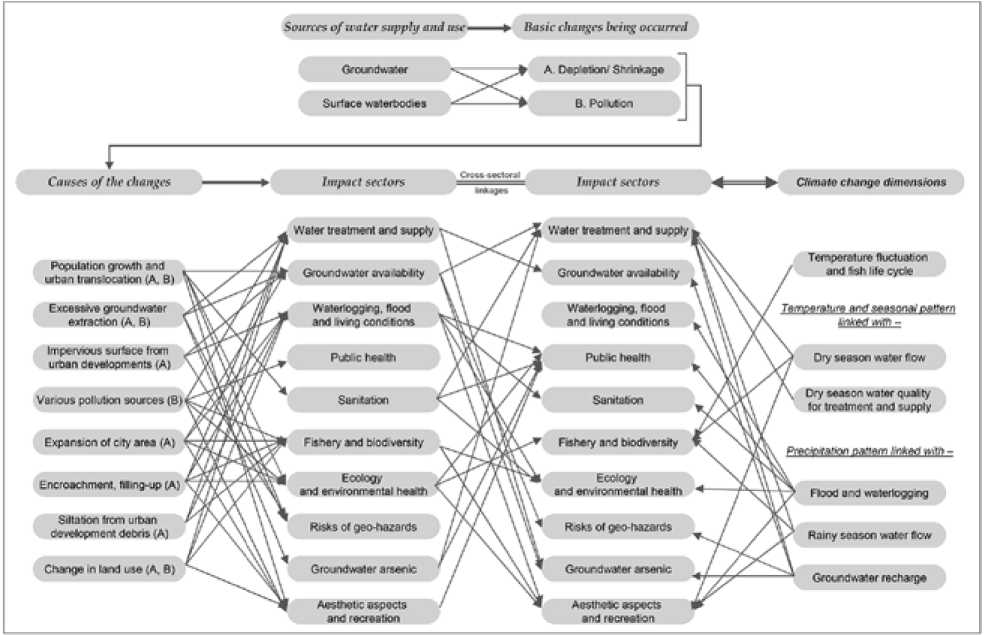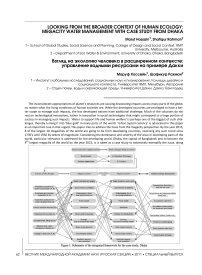Взгляд на экологию человека в расширенном контексте: управление водными ресурсами (на примере Дакки)
Автор: Маруф Хоссейн, Шафикур Рахман
Журнал: Вестник Международной академии наук (Русская секция) Электронный ресурс @vestnik-rsias-online
Рубрика: Антропоэкосистемы в биосфере: обеспечение безопасности, здоровья и качества жизни
Статья в выпуске: 2, 2011 года.
Бесплатный доступ
Невнимательные ассигнования ресурсов планеты наносят разрушительные последствия во многих частях земного шара, независимо от условий жизни человеческих обществ. Хотя развитые страны имеют привилегию иметь больше возможностей для управления такими последствиями, менее развитые страны сталкиваются с дополнительными проблемами.
Короткий адрес: https://sciup.org/14315467
IDR: 14315467
Текст статьи Взгляд на экологию человека в расширенном контексте: управление водными ресурсами (на примере Дакки)
-
1 - Институт глобальных исследований, социальных наук и планирования, Колледж дизайна и социального контекста, Университет RMIT, Мельбурн, Австралия
-
2 - Отдел почвы, воды и окружающей среды, Университет Дакки, Дакка, Бангладеш
The inconsiderate appropriations of planet’s resources are causing devastating impacts across many parts of the globe, no matter what the living conditions of human societies are. While the developed countries are privileged to have a better scope to manage such impacts, the less developed nations have additional challenge. Much of the solutions do not rest on technological innovations, rather in innovation in social technologies that might correspond to a large portion of success in managing such impacts. ‘Water to support life and human welfare’ is perhaps one of the biggest of such challenges, thereby turning it into ‘blue gold’ in many parts of the world. ‘Urban System Science’ is advocated in this paper as an important tool in that regard. This paper tries to address the issue from the megacity perspective. By the year 2015, 8 of the largest 10 megacities of the world are going to be from developing countries, reversing any such trend since 1730’s until 1950 by orders of magnitude. Considering the dominance and severity of the issue in developing parts of the world, particular relevance is addressed for the developing world. Dhaka, the capital of Bangladesh and to become the 4th largest megacity of the world by the year 2025, is is taken as a case study to extensively exemplify the issue, along

Figure 1: Schematic of the integrated framework for the case-study, Dhaka
Антропоэкосистемы в биосфере: обеспечение безопасности, здоровья и качества жизни РАЗДЕЛ 1
with briefly summarizing some other megacities’ conditions. The analysis on Dhaka is put together in constructing an integrated framework demonstrating impacts/challenges by combining ‘source of water supply and use’, ‘basic changes undergoing’, ‘causes of such changes’, ‘the impact sectors associated’, and ‘climate change dimensions’. Policy implications are summarized following the integrated framework for Dhaka’s waterbodies. The general/common challenges for megacities’ waterbodies are identified to be regional uneven representation in scientific literature, globalization, growth versus planning process, urban organization theories and tools for understanding complexity of urban system, arid basin management, ‘special needs’ groups and social vulnerability, and historical problems.
Schematic of the integrated framework for the case-study, Dhaka, is presented in Figure 1.
МЕЖДУНАРОДНАЯ КОНФЕРЕНЦИЯ • «Экология человека: здоровье, культура и качество жизни»


